December Guitar Student of the Month – Anay Sourya Pillutla
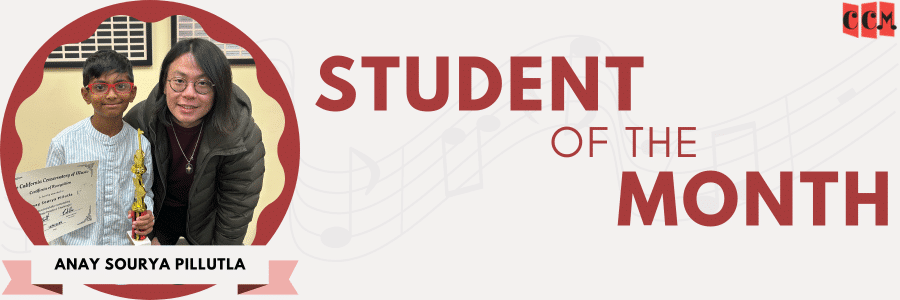
For December’s Student of the Month, we are honoring CCM guitar student, Anay Sourya Pillutla! Anay has been taking guitar lessons for almost 6 years now and is currently studying with teacher Mario at our Sunnyvale location. Anay happily takes on any challenges in his lessons with a smile on his face. Teacher Mario says, “He is one of the most adventurous students a teacher can ask for!” Anay recently completed the 2 year practice challenge at CCM which means he has practiced every single day for 2 years – what a magnificent achievement! Keep up the great work, Anay!
Student of the Month Questionnaire – Anay Sourya Pillutla
What is your name?
Anay Sourya Pillutla
How old are you?
I am 10 years old.
Who is your teacher?
I am a student of great music masters. In my quest for music, Matt and Brad are the founders of guitar basics. Now I am with Mario, together we are putting pieces of music into elegant castles of music.
How long have you been taking guitar lessons?
From 2160 days of my life. (Technically 6 years).
What advice would you give to a guitar student just starting at CCM?
Find your spark at music! Make sure to have fun. Learn cool stuff.
What piece are you looking forward to learning someday?
Anastasia, Thunderstruck, and Back in Black. Level up to get into RCM (this is my dad).
What is your favorite thing about playing guitar?
I like the feeling when you pluck a string. The music feels moving through your body.
What is your favorite food?
Gobi manchurian (Indo-Chinese), Biryani, Paneer curry, Pizza, Dal and Dad’s fried rice.
Do you have a pet?
No.
Do you play any sports or do any other activities outside of music lessons?
Judo, Basketball, Video games & Board games.
What do you want to be when you grow up?
To be an engineer like dad or a composer.
What is your most memorable experience at CCM?
When I finished my first song in Book 1, first recital and sometimes stories from teachers on how they succeeded.
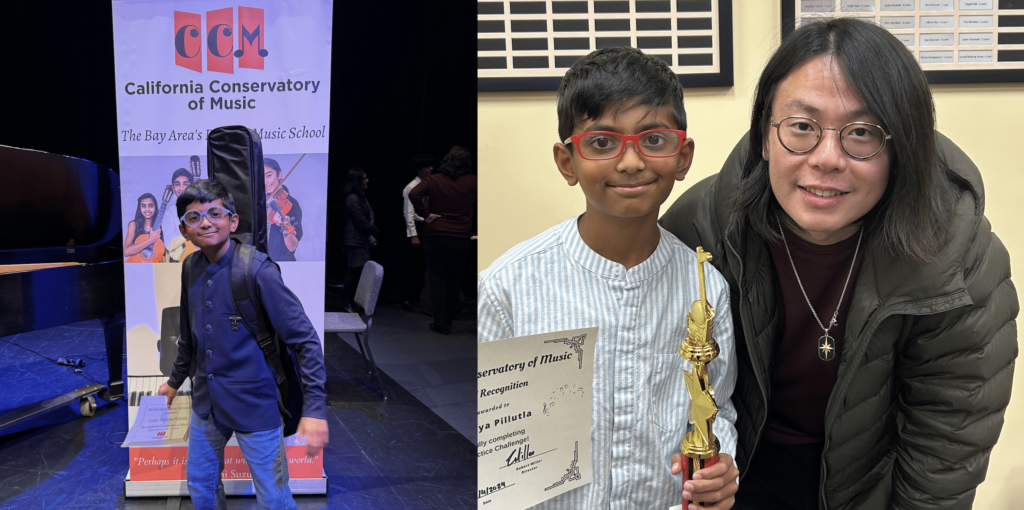
Parent Spotlight – Arun Rahul & Swathi
Music and teaching at CCM build character and resilience in our kid. His music sense improved a lot. Things taught at CCM are more than the lesson plan.
Be patient and enjoy the ride. Go sit in all their classes and recitals, it is free music 🙂
Why did you decide to give your child a musical upbringing?
Apart from building neural pathways for problem-solving by learning music. Music keeps us relaxed and sane. We want our kids to have it. In this world where anything can be made using programming and machines. Creating something from your hands gives a unique personal touch.
Watch Anay’s recital performance below!
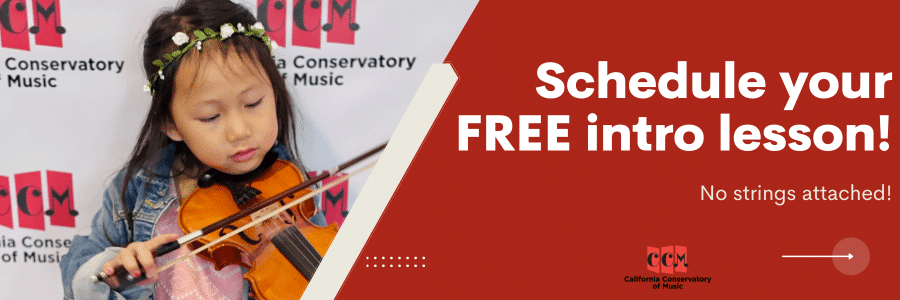
Preparing for Your First Student Performance: A Step-by-Step Guide

Stepping onto the stage for the first time can be a defining moment for any music student. This blog offers essential tips to prepare for your first student performance, ensuring you deliver a memorable and confident presentation.
The Importance of Preparation
The key to a successful student performance lies in thorough preparation. Begin to discuss the recital with your instructor at least one month in advance. Your teacher can help you prepare the perfect piece for your first performance! Choosing the right music piece is crucial. Opt for a piece that not only showcases your strengths but also one you connect with emotionally. Your passion for the piece will translate into a more engaging performance.
Regular Practice
Consistent practice is the foundation of any great performance! Break down your piece into sections and tackle difficult parts with focused sessions. It helps to record audio or video of your practice sessions as well so that you can listen for potential room for improvement. It’s also smart to play your recordings for your teacher so that they can give you pointers as well. And don’t forget to use a metronome to keep your timing accurate and consistent!
Mock Student Performance and Rehearsals
Perform in front of friends, family, or your music teacher. This simulates the actual performance and helps ease anxiety. Plus, feedback from these sessions can be invaluable in refining your presentation.
On the day of your student performance, arrive at the venue early to acclimate yourself. Start by familiarizing yourself with the stage and its acoustics. Make sure your guitar or violin is tuned and if you are a pianist or vocalist, test out the piano and/or mic! This helps in adjusting your playing or singing to the space. Knowing your environment will significantly boost your confidence!
Managing Stage Fright
Stage fright is common with student performances, especially for first-timers! Practice deep breathing exercises to manage your nerves. Visualize your success on stage to build a positive mindset. Remember, a little nervousness can enhance your performance by keeping you alert. Pro tip: Transform your nerves into excitement! You get to showcase all of your hard work!
Post-Performance Reflection
After your performance, reflect on what went well and what could be improved. Discuss your experiences with your teacher to gain further insights. Each performance is a learning opportunity, so take the feedback constructively. Remember, completing a performance is a success in and of itself!
Your first student performance can be a thrilling experience that sets the stage for future success. By preparing thoroughly, managing nerves, and engaging your audience, you’ll not only enhance your skills but also gain confidence in your abilities as a performer.
Further Information
Whether you are a beginner or looking to polish your skills, it’s the perfect time to begin your musical journey at The California Conservatory of Music!
Sign up for a FREE introductory lesson at The California Conservatory of Music today.

Joan Tower: December Composer of the Month
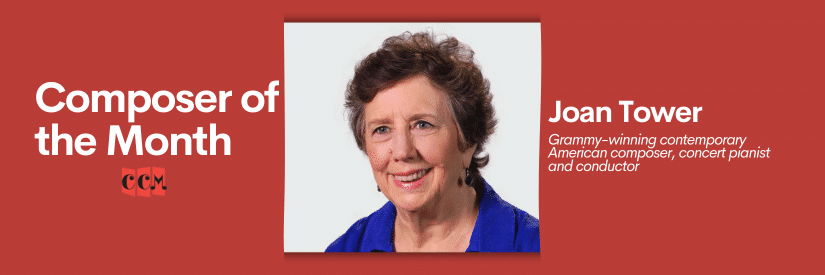
Joan Tower is a beacon of innovation in American music! For, CCM’s December Composer of the Month, we are deepdiving into Tower’s musical career and impact. Her compositions resonate with the boldness and intricacy that define contemporary classical music. Through her works, she has carved a niche that celebrates both complexity and accessibility in modern orchestration.
Early Life and Inspirations
Born in 1938 in New York, Joan Tower’s musical journey began against a backdrop of diverse cultural influences. Her family moved to Bolivia when she was nine, a period that profoundly shaped her musical perspective. The rich tapestry of South American music deeply influenced her, infusing her compositions with a blend of traditional and avant-garde elements. Tower started piano lessons early, and her fascination with music composition grew as she explored various musical styles. This early exposure laid the groundwork for her eclectic and vibrant compositional voice.
Tower’s Music Career
Joan Tower’s music career took flight after her formal education at Bennington College and the Columbia University. She quickly established herself as a force in the classical music scene. In 1969, she founded the Da Capo Chamber Players, a group dedicated to performing works by living composers, which became a platform for premiering her compositions. Tower’s career is marked by her tenure as a professor at Bard College, where she has influenced many young composers. Her role as a composer and educator has made significant contributions to the expansion and appreciation of contemporary classical music.
Unique Aspects of Her Music
Joan Tower’s music uniquely melds lyrical narratives with structural complexity. Her compositions often reflect themes of challenge and triumph, a mirror to her own experiences in a male-dominated field. Tower has a knack for creating music that is as intellectually engaging as it is emotionally resonant. Her use of rhythm and timbre breaks from tradition, giving her music a distinctive, immediate quality that speaks directly to listeners. Moreover, her focus on orchestral color and texture allows her to communicate with a rich and varied musical vocabulary.
Tower’s Notable Works and Themes
Among her many accolades, Tower’s “Fanfare for the Uncommon Woman” stands as a pivotal work, inspired by Aaron Copland’s fanfare but dedicated to women who take risks and break barriers. Her other significant works include “Silver Ladders,” “Made in America,” and the piano concerto “Homage to Beethoven.” These compositions not only showcase her mastery of orchestral forces but also reflect her deep commitment to thematic depth and innovation. Each piece is a testament to her belief in music as a force for expression and change.
Final Thoughts
Joan Tower’s enduring impact on the world of classical music is undeniable. Her works continue to inspire and challenge both performers and audiences. As CCM’s Composer of the Month, we honor her remarkable contributions and the paths she has paved for future generations in music. Her compositions remain a vital part of the repertoire, celebrated for their emotional power and structural ingenuity.
We invite our readers to delve deeper into the life and works of Joan Tower. Her compositions are not just music; they are narratives woven through sound, offering insights into the complexities of human experience and artistic creation. For those interested in exploring her extensive oeuvre, we recommend starting with her most celebrated pieces, which are readily available for listening through various online platforms.
Through this blog, we aim to bring Joan Tower’s visionary works into the spotlight, offering our community a chance to engage with music that transcends the ordinary and challenges the conventional. Join us in celebrating a composer who has truly shaped the landscape of contemporary classical music.
Sign up for your FREE introductory lesson at The California Conservatory of Music today!

November Piano Student of the Month – Divye K Sood

For November, we are excited to feature CCM piano student, Divye K Sood, as our Student of the Month! Divye has been taking piano lessons for 4.5 years now and has studied with teacher Jane at our Sunnyvale location for over 2 years. Teacher Jane says, “He’s consistently been diligent with his practice and his hard work reflects in his playing!” Divye received a distinction on his grade 3 ABRSM practical exam in May and he is now getting ready to do his grade 4 exam by the end of this year. Congratulations, Divye and keep up the great work!
Student of the Month Questionnaire – Divye K Sood
What is your name?
Divye K Sood
How old are you?
11 years
Who is your teacher?
Ms Jane
How long have you been taking piano lessons?
4.5 years
What advice would you give to a piano student just starting at CCM?
Stay consistent and practice regularly every day. Make piano playing a part of your learning schedule and follow it.
What piece are you looking forward to learning someday?
I am waiting for the day when I play songs like Presto, Billie’s Song, Ninette’s Musette, or the Nutcracker on a grand piano.
What is your favorite thing about playing piano?
I really enjoy how the music comes out of the piano. It enthralls me so much that I keep playing a piece of music even more until my practice is done.
What is your favorite food?
Veggie pizza and pita sandwich.
Do you have a pet?
No.
Do you play any sports or do any other activities outside of music lessons?
Basketball, cricket, and reading books.
What do you want to be when you grow up?
I want to be a computer scientist and continue as a piano player.
What is your most memorable experience at CCM?
My most memorable experience at the CCM is when I cleared my Grade 1 Piano ABRSM Exam with distinction. When I cleared it, I shared it with my teacher and I got my picture clicked with her.
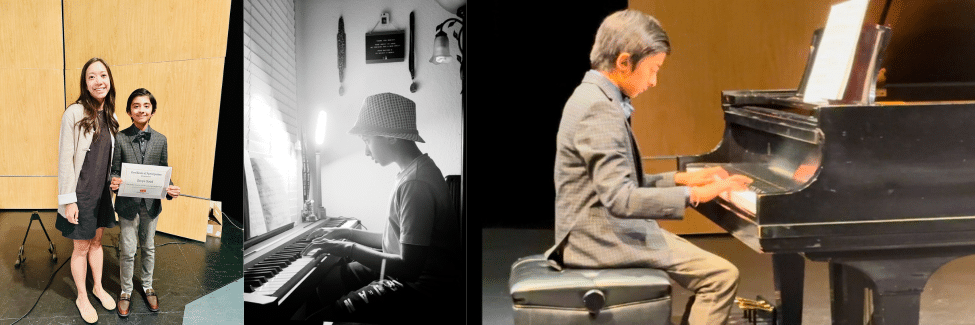
Parent Spotlight – Aditya K Sood & Roshni K Sood
Divye’s dedication to learning piano.
Encouraging the child to maintain a regular practice schedule.
We wanted music to be an important part of his life, which he can always enjoy, cherish, and it will help him maintain a calm and peaceful mind in various life situations.

María Dueñas: November Musician of the Month
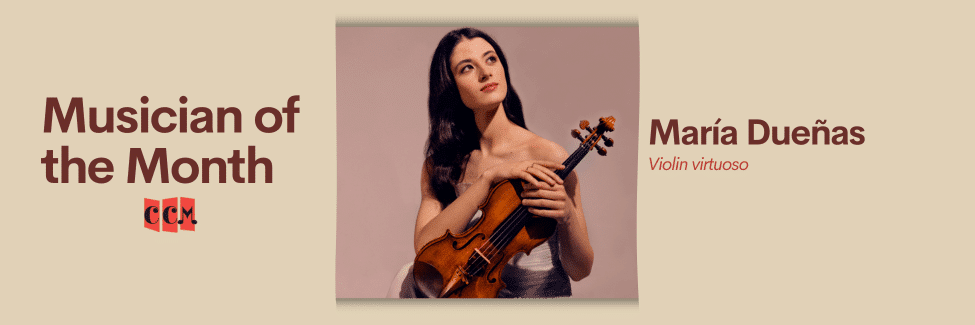
This November, we are proud to spotlight María Dueñas as our Musician of the Month at the California Conservatory of Music (CCM). María is a violin virtuoso that captivates audiences with her musicality and profound emotional depth. Her performances seamlessly blend technical precision with passionate expression, setting her apart in the world of classical music.
Early Life and Inspirations
María grew up surrounded by a family that cherished musical traditions, immersing her in music from a young age. She took up the violin early, instantly drawn to its complex and emotive capabilities. Inspired by violin legends like Itzhak Perlman and Hilary Hahn, she pursued rigorous training, showcasing an innate talent for the instrument. Her early exposure to a range of musical styles fueled a deep love for both classical and contemporary works, shaping her future as a versatile and dynamic performer.
María’s Musical Career Highlights
María’s career is a testament to her dedication and skill. She has performed with renowned orchestras across the globe, earning accolades for her vibrant and nuanced performances. Her journey through music competitions has earned her numerous awards, highlighting her as a standout talent in her generation. Each performance by María not only displays her technical prowess but also her ability to connect deeply with her audience, making each concert a memorable event.
Unique Aspects of Marías’s Music
What truly sets María apart is her approach to music as a form of storytelling. She interprets each piece as a narrative, using her violin to convey emotions and stories that resonate with listeners. Her commitment to exploring the expressive potential of music leads her to experiment with sound and technique, pushing the boundaries of traditional violin playing. This exploratory spirit is evident in her performances, which are both innovative and grounded in classical expertise.
Notable Performances and Recordings
Among her many achievements, María’s interpretation of Tchaikovsky’s Violin Concerto has been particularly celebrated for its emotional intensity and technical mastery. Her recordings, including works by Mendelssohn and Paganini, showcase her adaptability and flair for bringing new life to classical compositions. These recordings have not only captivated classical music enthusiasts but have also garnered critical acclaim, further establishing her as a leading figure in the music world. Check out María’s performance Mendelssohn’s Concerto in E minor.
Final Thoughts
María Dueñas is more than just a musician; she is an artist who paints with notes and rhythms. Her contribution to the world of music is immense, inspiring current and future generations of musicians. As CCM celebrates her as the Musician of the Month, we invite everyone to delve into her musical world and experience the power and beauty of her performances. María’s journey underscores the transformative power of music and the heights that can be reached with passion and perseverance.
Sign up for your FREE introductory music lesson at The California Conservatory of Music!

Extracurricular Activities: Balancing School and Music Lessons
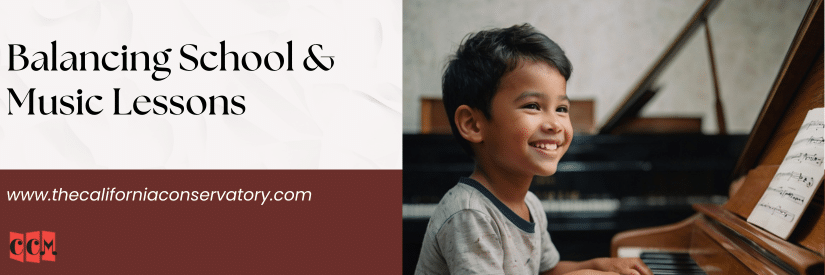
In today’s fast-paced educational environment, balancing school with extracurricular activities can be a challenge for many students and their families. Music lessons, a popular choice among extracurricular activities, offer profound benefits while requiring time and dedication. This blog explores effective strategies to balance school responsibilities with music lessons, ensuring students can thrive in both arenas!
Benefits of Music Lessons as an Extracurricular Activity
Music lessons are more than just an artistic outlet; they provide a range of benefits that support academic and personal growth. Engaging in music improves cognitive abilities, enhances time management skills, and fosters emotional expression. These skills are invaluable, not only academically but in overall personal development. By recognizing the dual benefits of music as an extracurricular activity, families can appreciate the importance of maintaining this balance.
Setting Realistic Goals
Balancing school and music lessons starts with setting realistic goals. Students should outline clear, achievable objectives for both their academic and musical pursuits. This might involve scoring well on tests or reaching the next book level in music lessons. By setting goals, students can monitor their progress and adjust their efforts in school and music lessons accordingly.
Effective prioritization is key in managing school and extracurricular activities. Students should identify which tasks require immediate attention and which can wait. For instance, during recital season, you may try to fit more music practice into your schedule so that you feel prepared to perform. Learning to prioritize helps students reduce stress and focus on tasks that require the most attention.
Creating a Structured Schedule
A well-planned schedule is crucial to balance school and music lessons effectively. Students should allocate specific times for homework, study, music practice, and relaxation. This structure prevents overcommitment and ensures that students have ample time for both academic and musical growth. Utilizing planners or digital calendars can help keep track of assignments and upcoming music recitals, making it easier to manage time effectively. Consider a reward system as well to keep students excited to practice and learn more in school!
Utilizing Activity Resources & Communication
Open communication with school teachers and music instructors can facilitate better balance. Informing them about each other’s schedules and significant deadlines can help them understand the student’s commitments. Teachers and instructors often can provide guidance on managing workload and might even coordinate to support the student’s needs. Many schools offer resources that can help students balance their coursework with extracurricular activities. Tutoring, study groups, and academic counseling are valuable resources that can help manage schoolwork more efficiently. At the California Conservatory of Music, we have a great practice incentive program! Our program includes practice streaks: kids can get medals, and certificates for consistently practicing, homework sheets and practice points, and the Practice Space App! Taking advantage of these resources can free up more time for music practice and reduce academic pressure. Ask about CCM’s practice incentives!
Learning Efficient Practice Techniques
For students balancing school and music lessons, effective time management is crucial. The Pomodoro Technique is especially useful; dedicate 25-minute blocks to tackling specific challenges, such as a difficult music passage or a complex math problem, followed by a 5-minute break to reset. Utilize technology to streamline practice—apps like metronomes for musicians and flashcard tools for academics can enhance productivity. Aim for short, frequent review sessions rather than lengthy, infrequent ones, as this helps reinforce material more effectively. Above all, consistency is key; regular, focused practice sessions contribute to significant improvements in both academic and musical pursuits, making the balancing act more manageable and less stressful.
Final Thoughts
Balancing school with music lessons, like any extracurricular activities, demands careful planning, communication, and prioritization. By adopting structured schedules, setting realistic goals, and using efficient study techniques, students can excel in their academic and musical endeavors. Ultimately, the goal is to enjoy and benefit from both educational experiences without compromising on either.
Sign up for a FREE introductory music lesson at The California Conservatory of Music!

Guitar & Voice Students of the Month – Sharvari & Arjun
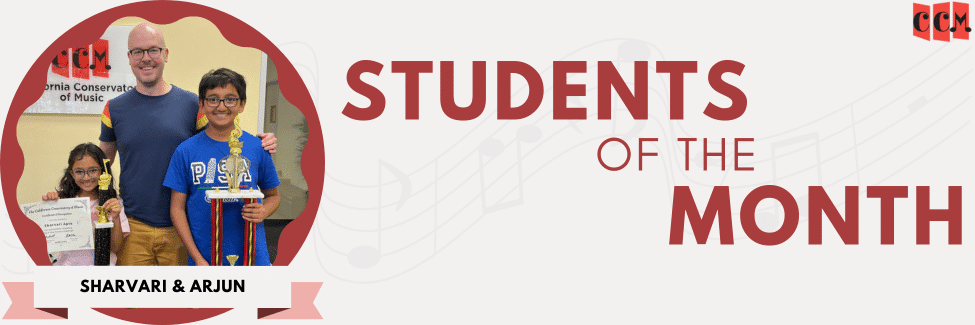
For September and October, we’ve chosen to spotlight CCM voice and guitar students, Sharvari and Arjun, as our Students of the Month! Arjun has been taking guitar lessons at CCM for 8 years now and currently studies with teacher Tim at our Sunnyvale location. Arjun’s sister, Sharvari, has been taking guitar lessons for 5 years, also with teacher Tim. She also has been taking voice lessons for 3 years and currently studies with Teacher Nyla. Sharvari and Arjun are extremely dedicated students and each one of their previous and current teachers has truly enjoyed teaching them! Sharvari recently completed 4 years of consecutive guitar practice and Arjun completed 8 years – Congratulations!!
Student of the Month Questionnaire – Sharvari and Arjun
What is your name?
Sharvari
Arjun
How old are you?
Sharvari: 8 years old
Arjun: 13 years old
Who is your teacher?
Arjun: Teacher Tim (guitar lessons)
Sharvari: Teacher Tim (guitar lessons), Teacher Nyla (current voice teacher), Teacher Orlia and Teacher Gaby (past voice teachers)
How long have you been taking guitar lessons?
Arjun: for 8 years
Sharvari: for 5 years
How long have you been taking voice lessons?
Sharvari: for 3 years
What advice would you give to a student just starting at CCM?
Sharvari: Keep on practicing
Arjun: Never give up
What piece are you looking forward to learning someday?
Arjun: Xaranga Do Vovo by Celso Machado
Sharvari: Bourrée by L. Mozart (Suzuki Book 4)
What is your favorite thing about playing your instrument?
Arjun: I enjoy the sound of guitar
Sharvari: It is fun to play new music pieces
What is your favorite food?
Arjun: Pizza
Sharvari: Lasagna
Do you have a pet?
No
Do you play any sports or do any other activities outside of music lessons?
Arjun: I enjoy playing tennis and swimming, and I play trumpet in our school’s band
Sharvari: I have been learning an Indian classical dance form called Kathak and I play tennis and do Taekwondo.
What do you want to be when you grow up?
Arjun: Doctor
Sharvari: Author
What is your most memorable experience at CCM?
Arjun: Playing at my first ever recital
Sharvari: Participating at CCM recitals
Parent Spotlight – Atul and Smruti
We are most proud of their dedication to daily practice. The practice incentives at CCM and encouragement from Teacher Tim established a great foundation to make daily practice a habit. Their guitars have accompanied them even at Disneyland and for overseas travel to Europe and India.
Trust the methodology of the CCM teachers (they are great at what they do) and encourage your child to practice daily (even 5 mins of focused practice counts).
We believe that music is a good way to generate happiness within and around you. We felt that an early and constant exposure to classical music would build a love for it and would hopefully help them in the long run. Music is a lifelong friend.

Zhou Long: November Composer of the Month
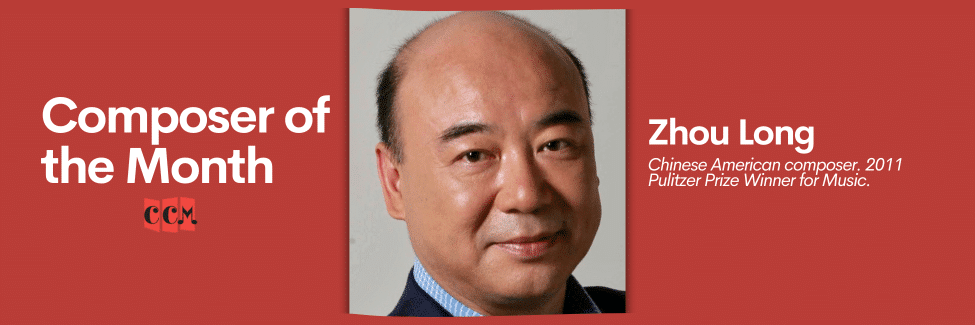
This November, we celebrate Zhou Long, a distinguished composer whose work masterfully blends Eastern and Western musical traditions. Long’s compositions offer a unique dialogue between the ancient musical heritage of China and contemporary Western techniques. His innovative approach makes him a significant figure in the world of modern classical music.
Early Life and Inspirations
Born in 1953 in Beijing, Zhou Long was surrounded by the rich heritage of Chinese traditional music. Growing up during a culturally vibrant yet politically complex time, he was naturally drawn to the arts. His initial exposure to music came through traditional Chinese opera and the ancient sounds of Chinese instruments. This early immersion in his culture deeply influenced his artistic direction!
As a young student, Zhou Long was fascinated by the music of his own culture, but he also showed a keen interest in Western classical music! At the time, his access to Western classical music was limited, but his curiosity prevailed. His intrigue led him to explore the works of composers like Beethoven and Mozart, whose structures and themes added a new dimension to his understanding of music. This blend of Eastern and Western influences during his formative years set the stage for his future as a bridge between these two worlds.
Long’s Music Career
Zhou Long’s career trajectory changed dramatically when he moved to the United States in the early 1980s to seek greater creative freedom. In the States, he began to study the avant-garde techniques of Western composition at Columbia University. Zhou studied under Chou Wen-chung, a pioneer in bridging Eastern and Western music philosophies. This period was crucial as it expanded his musical vocabulary and opened up new avenues for creative expression.
In the US, Long began experimenting with integrating Chinese musical concepts and instruments into Western classical frameworks, which became his signature style. His compositions during this period began to gain attention for their innovative synthesis of musical traditions. His success later earned him commissions from major orchestras and ensembles around the world!
Unique Aspects of His Music
Zhou Long’s compositions are characterized by their intricate melding of cultural elements. He often incorporates traditional Chinese instruments such as the pipa, erhu, and guzheng into symphonic compositions, creating a fascinating interplay of timbres and traditions. Moreover, his work frequently features pentatonic scales and traditional Chinese melodies reimagined within complex, contemporary harmonic structures.
This synthesis is not just about combining instruments or melodies but also about rethinking composition from the ground up. Zhou Long treats each piece as a cultural conversation, where every note and rhythm is a part of a larger narrative that bridges thousands of years of musical history.
Long’s Notable Works and Themes
Zhou Long’s most celebrated opera, “Madame White Snake,” earned him the Pulitzer Prize for Music in 2011. The opera is a testament to his ability to weave narrative, culture, and music into an engaging and modern composition. It tells a traditional Chinese tale through a score that combines both Western operatic form and Chinese melodic elements. This work showcases his dual mastery of these musical domains – a staple in his art!
Other significant works include “The Rhyme of Taigu,” which explores rhythmic patterns derived from ancient Chinese drumming practices, and “Song of the Ch’in,” which reflects the meditative quality of traditional Chinese stringed instrument music. Each composition not only serves as a piece of music but also as an exploration of cultural identity and expression.
Final Thoughts
Zhou Long is a composer who brings worlds together, creating a musical language that transcends geographical and cultural boundaries. His work challenges listeners to hear not just the convergence of East and West but the possibilities of new musical forms emerging from this fusion. As we feature him as our Composer of the Month this November, we celebrate his profound impact on the musical world and the continued relevance of his work in fostering global cultural understanding through music.
In celebrating Zhou Long, we acknowledge a visionary artist whose life’s work enhances our appreciation of the vast possibilities within the world of music. His compositions remain a vital part of contemporary classical music, enriching the global music scene with sounds that are both innovative and deeply reflective of his cultural heritage.

Arnold Schoenberg: October Composer of the Month
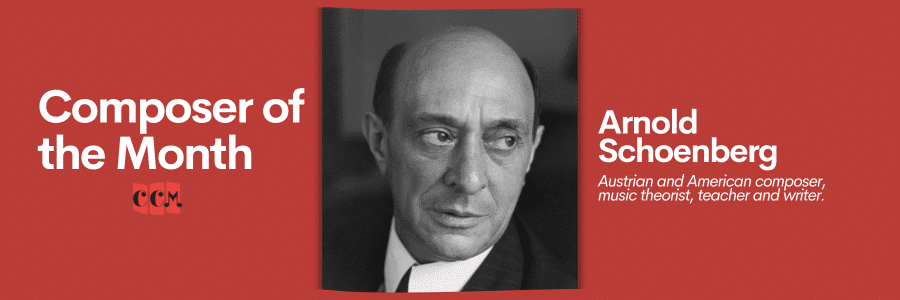
Arnold Schoenberg, a pivotal figure in the evolution of modern music, revolutionized the way we understand and appreciate classical compositions. Renowned for his twelve-tone technique, Schoenberg’s work challenges conventional musical boundaries. He effortlessly invites listeners into a world of complex, innovative soundscapes. This October, join us as we delve into his life and legacy. With his haunting melodies and depth shown in Pierrot Lunaire, he’s the perfect composer to learn about this spooky season!
Early Life and Inspirations
Arnold Schoenberg was born on September 13, 1874, in the vibrant cultural hub of Vienna, Austria. From an early age, Schoenberg exhibited a keen interest in music, though he was largely self-taught. The romanticism of prominent 19th-century figures Wagner and Brahms heavily influenced his initial musical explorations. As he matured, Schoenberg questioned the traditional tonal systems used by these musical giants, driven by his pursuit of innovation. Overall, his Jewish heritage and Vienna’s rich intellectual environment deeply shaped his musical philosophy, adding complexity to his works.
Schoenberg’s Music Career
Schoenberg’s career highlights his leadership in the Second Viennese School, mentoring luminaries like Alban Berg and Anton Webern. His shift from romanticism to atonality drastically changed his compositional style, challenging traditional musical aesthetics. In the early 1920s, he developed the twelve-tone technique, offering a new method to structure atonal music. This technique treated all twelve tones of the chromatic scale equally, fundamentally altering the structural basis of music composition.
Unique Aspects of His Music
Schoenberg’s approach to music was characterized by a rigorous, almost scientific method, yet it was deeply expressive and emotive. His compositions explored themes like existential angst and identity, challenging both the ears and minds of listeners. His theoretical writings on music still influence teaching and understanding today, affirming his unwavering status.
Notable Works and Themes
Among his vast repertoire, Pierrot Lunaire stands out for its textural richness and emotional depth. Composed in 1912, this melodrama features 21 settings of Albert Giraud’s poems, each depicting life and dreams through Pierrot. This work showcases Schoenberg’s use of atonality to boost expressive power without traditional harmonies. Other key works, Verklärte Nacht and Moses und Aron, explore transformation, morality, and faith. His music’s complexity and intellectual rigor make each listening a deeply reflective experience.
Expanding Schoenberg’s Influence
Beyond composition, Schoenberg’s influence extended into academia and pedagogy. He taught at the Prussian Academy of Arts and UCLA, influencing generations of composers and musicians. His teaching methods and philosophical approach to music education emphasized both technical skill and expressive capability, leaving a lasting impact.
Final Thoughts
Arnold Schoenberg remains a monumental figure in classical music, whose innovations laid the groundwork for much of modernist music in the 20th century and beyond. His fearless exploration of new musical territories, commitment to deep emotional expression, and profound impact on music theory and education highlight his enduring legacy. As we explore Pierrot Lunaire this October, we are reminded of the power of music to challenge, transform, and transcend. Schoenberg’s life and works continue to inspire and provoke, offering endless insights into the possibilities of musical expression.
Sign up for a FREE introductory music lesson at The California Conservatory of Music!

How to Practice Effectively & Consistently

Practicing music effectively goes beyond just playing notes correctly—it’s about deepening your understanding and enhancing your connection with the music. This guide is designed to help you get the most out of your practice sessions, ensuring they are as productive and enjoyable as possible!
Crafting Effective Music Practice
Good music practice is more than just a habit; it’s a strategic approach aimed at improving your musical skills efficiently. It involves setting specific goals, maintaining focus, and creating a structured routine. These components transform your practice from mere repetition to a valuable part of your musical development.
Setting Clear Goals
Start each practice session with specific, achievable goals. What do you want to achieve today? Whether it’s beginning a difficult piece, improving a technique, or practicing scales, having clear objectives will give your practice direction and purpose. Structure is crucial in making the most of your practice time. Divide your session into various segments—start with warm-ups, move on to technical exercises, dedicate time to pieces or songs, and perhaps conclude with some creative improvisation or sight-reading. This variety not only keeps your practice engaging, but ensures you’re developing a wide range of skills.
Prioritizing Quality over Quantity
Staying fully present during your practice session is vital. Pay attention to every detail of your playing or singing, making conscious adjustments and improvements. This focused approach helps you not only play the notes correctly, but also connect more deeply with the music, understanding its nuances and expressions.
Quality always trumps quantity when it comes to practicing. It’s better to have shorter sessions where you are completely focused and engaged than longer ones where your attention wanes. For example, a focused 10-30-minute session can often be more productive than a distracted two-hour stint.
Leveraging Music Practice Resources
Make use of the technology at your disposal! Metronomes help with timing, tuners assist with pitch accuracy, and recording devices allow you to listen back and critically evaluate your performance. These tools are indispensable for ensuring accuracy and providing feedback that’s essential for growth. Additionally, Practice Space is a music practice platform that has everything you need at your disposal. Receive multimedia assignments directly from your teacher, get your questions answered immediately, record your practice, and get rewarded for completion! Learn more about Practice Space here.
Embracing Feedback
Regular feedback is essential for improvement. Play for teachers, peers, or family members and listen to their input. Different perspectives can provide new insights and inspire you to refine your techniques further. Additionally, participating in group lessons or organizing family performances can offer valuable communal feedback. Treat mistakes as learning opportunities rather than setbacks. Analyze why an error occurred and experiment with ways to correct it. This proactive approach helps you overcome challenges and prevent similar issues in the future.
Effective & Consistent Music Practice
Consistency is key in building and maintaining musical skills. Try to practice daily, even if it’s only for a short period. Regular practice helps reinforce what you’ve learned and keeps your skills sharp!
Effective music practice is both a science and an art, requiring thoughtful organization and a genuine engagement with your musical materials. By incorporating these strategies into your routine, you can significantly enhance the effectiveness of your practice sessions. Always remember, the ultimate goal is to enjoy your music and continuously grow as a musician. Embrace each practice session with passion and dedication, and you’ll see great improvements in your musical abilities.
Sign up for a FREE introductory music lesson at The California Conservatory of Music!

